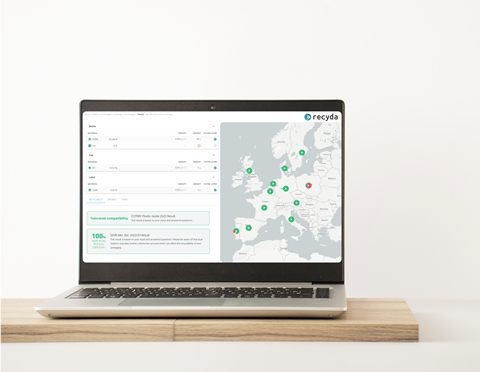
Our latest Sustainability Awards Finalist Interview is with Recyda about its software for packaging recyclability management, nominated in the commercialized Driving the Circular Economy category.
You’re a finalist in the Sustainability Awards 2023. Congratulations! To start off, could you summarize your entry, in less than 50 words?
Recyda’s innovative software aims to create transparency with regards to packaging sustainability and promote the circular economy through digitization. The Recyda software empowers a variety of stakeholders in the packaging industry to perform accurate country-specific recyclability and cost assessments to inspire change and drive the circular economy.
Why do you think the judges were impressed with your entry? Tell us about what is innovative about your project and/or about its impact on packaging sustainability.
The packaging industry finds itself at a time where it is going through revolutionary change and with that comes opportunity. Recyda’s digital packaging recyclability software offers an all-in-one solution that creates transparency in a dynamic and complex environment to empower a wide variety of change makers in our industry.
Addressing the challenges of the industry in moving towards ambitious goals set at national and international level (for example, by the Packaging and Packaging Waste Regulations) with a data-driven approach, is an important missing piece of the puzzle that has been missing. Without data and without digital approaches, companies are losing valuable time and do not have the comprehensive picture to make the right choices for their packaging. This is where the Recyda software offers a solution and creates impact.
How has your innovation/initiative been received?
We started building the Recyda software around 3.5 years ago, and since then have always received great support from various stakeholders along the packaging value chain. In the end, packaging producers and brand owners as well as retail are all facing challenges with regards to the various recyclability requirements. The software serves as an enabler to these companies which is why there has been great interest in the industry in supporting this innovation.
You’re shortlisted for the Driving the Circular Economy category. What do you see as the key demands and challenges in relation to circularity in packaging?
One key challenge is the largely fragmented approach to packaging recyclability at a country-specific level. Our software tackles this challenge with a multi-faceted approach offering an expanding list of functionality and content to support our users.
Firstly, it provides a fact-based, objective, and centralized knowledge database of the waste management infrastructure for a growing list of countries covering a wide range of common packaging materials. Secondly, we have digitized the most pertinent laws shaping packaging recyclability.
One of the demands the packaging industry has is the certainty and tools that allow them to make the best choices in terms of compliance and sustainability for their packaging. The power of digital transposition allows users to quickly (mostly within seconds) make assessments against a variety of legislation for a large volume of packaging data.
We create transparency in recyclability and thus facilitate more sustainable packaging design. This contributes to a true circular economy in an international context and reduces waste and the need for virgin materials.
What do you think are the main opportunities in this area or what future innovations do you predict in this area?
One main opportunity is to enhance data quality and make data exchange more efficient along the value chain. With more data (specifically data on packaging specifications), companies can make more informed decisions.
Only when they understand their packaging can they understand their impact. This is why we believe digitization is a key contributor to the circular economy of packaging. With the knowledge at hand, innovation can become more targeted and help build the necessary solutions.
The winners of the Sustainability Awards 2023 will be announced at the Sustainable Packaging Summit, which takes place in Amsterdam on 14-15 November. The Summit mobilizes leaders of the FMCG value chain, policymakers, NGOs, recyclers and investors to collaborate, remove barriers and identify opportunities on the road to sustainable transformation.
To learn more or register, visit https://www.packagingsummit.earth/amsterdam2023/.
If you liked this article, you might also enjoy:
The L’Oréal approach to packaging sustainability
What steps is Apple taking to make its packaging more sustainable?
How did Brazil achieve its 100% aluminium can recycling rate – and can it be replicated in the EU?
Experts have their say on the EU’s Packaging and Packaging Waste Directive revisions













No comments yet